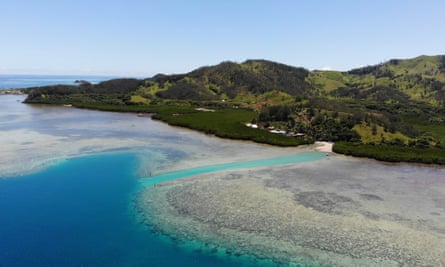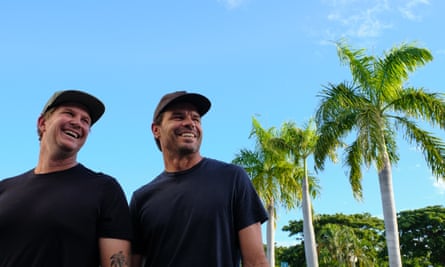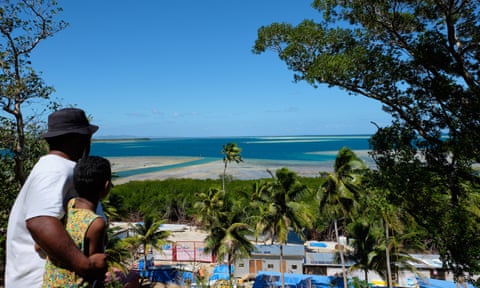It was one of the most surreal days of Jona Ratu’s life. On a May morning in 2018 he strolled down to the palm-fringed beach on a parcel of land he owns on idyllic Malolo island to find a digger parked on the coral reef.
“They just dug, they kept digging, digging, digging,” Ratu remembers.
Despite his demands for them to stop, the work continued “with big diggers on the reef, with all the oil running in the water.”
Ratu has spent his life on Malolo, a 5km-long tourist island that lies about 20km west of the main island of Fiji in the south Pacific. He works as a boatman, taking surfers out to Cloudbreak, a world famous surf spot that he points out from the shore – a line of white foam among the blue.
It was on trips to Cloubdbreak about five years ago that he met Australian surfers Navrin Fox and Woody Jack. The trio became friends and decided to club together to buy a parcel of land.
“It was like our dream,” says Ratu. “We got so lucky and we got this sick spot where you can wake up in the morning and see Cloudy.”
“But that’s about where the dream ends,” Fox says later.
The men went from planning an eco-resort to being locked in a environmental and legal battle with a China-linked company that would cost them tens of thousands of dollars, cause outrage across Fiji, and leave their corner of paradise unrecognisable.
“This is what it looks like now,” says Ratu, waving a hand out towards a devastated foreshore.
Running out from the land is a channel about 100m long and 20m wide – a blue gash running through the reef that surrounds the island.

All of the coral that was dug up to create the channel has been dumped on to the beach and into the shallow water in front of the land belonging to Ratu, Fox and Jack. The strip of sand and sea grass has been replaced witha flat plain of bleached coral crushed down to gravel.
“Unreal, eh?” Ratu says.
‘At the start it was pristine’
The company that owned the diggers was Freesoul, a real estate development company with a strong presence in Fiji. The Chinese embassy in Suva has said it is not a Chinese company, but Freesoul has close ties to China. The Guardian has found business records showing Freesoul was founded in 2016 and registered to an address in Shanghai. The company has previously said it decided to launch the Malolo venture “upon the invitation of Prime Minister Bainimarama to business houses including Freesoul on one of his visits to China” and New Zealand’s Newsroom claimed it also had the backing of a state-run Chinese media company.
In 2018 – after Freesoul got a lease for the parcel of land next to Ratu, Fox and Jack’s – construction began. The company’s plan was to build Fiji’s largest holiday resort: roughly 350 bures (traditional Fijian bungalows with thatched roofs) and the nation’s first casino.
Samuela Namuatabu, a customary landowner on Malolo Island from Solevu village, says the impact of the work, which saw mangroves destroyed and trees cut down, has been huge. “We cannot go and fish there any more. We cannot go and get seashells there anymore, the nature has gone.”
Dr Ken Chambers, Fox, Jack and Ratu’s lawyer, says there was a disregard for the environment at every level of Freesoul’s work. “They had 50 workers hammering away for six months and the effluent from those workers just went straight out through a pipe into the lagoon. We’ve got a picture of the pipe going out from the toilet block.”

When Ratu shows the Guardian around his land, it is the middle of school holidays and his four children plus nieces and nephews are running about and swinging from trees. Despite the heat of the day, they don’t venture into the water.
“They can’t swim now, because they are afraid,” Ratu says. “Before it was a nice wide beach [and they would be] swimming around on holiday, but now they can’t go because they are afraid of the dark channel [and] the water is so mucky.”
“At the start it was like pristine, like perfect, I mean untouched,” says Fox. “We rocked up to destruction, trees cut down on our land, building material all over it, petrol cans, excavators.”
When they saw the damage and realised the extent of Freesoul’s plans, Fox travelled to Suva where he found Chambers, who took on their case.
“And we haven’t looked back.”

‘I started smelling a rat’
Chambers, a gruff land law expert, says Freesoul’s actions in this case are “unbelievable” and should never have happened given Fiji’s strong environmental law. But he says that at several points things went wrong in the government departments that were supposed to enforce the legislation.

The first alarm bells rang when Fox, Jack and Ratu were told they would have to forfeit their land to Freesoul as they had breached their lease by not building on it for two years. However, the board that handles native land title in Fiji failed to serve them with a breach notice, as required. “I started smelling a rat as soon as they told me that they prepared the notice and when head office did a proper investigation they found it had never been served,” Chambers says.
Other issues include:
Freesoul began development without having environmental impact assessment (EIA) approval
After it started work, Freesoul was served with two injunction orders, but continued building work
The ministry of environment conducted an environmental impact assessment (EIA) in December 2018; a month later, the company was found to have breached nearly half of the EIA’s conditions
Finally, in April 2019, after media coverage of the fight by New Zealand website the Newsroom, the director of environment revoked Freesoul’s EIA approval. The company is due to face court later this month on environmental charges, which it denies.
For the moment, work has stopped and most Freesoul employees have left the island. The Guardian understands that Freesoul director Dick Peng wrote an email to those who assisted with the project, thanking them for their work and saying that the company would close down the Malolo project. Peng did not respond to the Guardian’s requests for comment, but the company has previously denied any breach of environmental rules.

Chambers says there is a “stench” to the whole situation and is calling for an investigation into the iTaukei Land Trust Board (TLTB) and the department of environment to find out why action was not taken earlier.
“It’s not just the Chinese developer wrecking the environment, it’s all the institutions covering their eyes.”
Joshua Wycliffe, permanent secretary for the ministry of waterways and environment, denies claims that the department was slow to act.
“The department did not allow Free Soul Development (FREDL) to continue its work at any stage. On the other hand the department issued stop work notices and did everything within the ambit of the law to stop them (while the matter was being handled through legitimate means),” said Wycliffe.
“To the best of my knowledge, none of my staff have indulged in any form of corrupt practice whilst dealing with FREDL. However, should anyone wish to call for an investigation there are legitimate means to approach the various options available to the public.”
TLTB was also approached for comment, but did not reply.
The prime minister, Frank Bainamarama, has also condemned Freesoul, saying: “As both a Fijian who treasures our environment and a global advocate for sustainable development, I share in the public’s outrage.”
But Fox and Jack say their situation is not that unusual.
“I think it’s resonating across the Pacific islands, New Zealand and even similarities in Australia,” says Jack. “People not doing the right thing, going, ‘We don’t have the approval but we’re just going to do it to the detriment of the people’.”
Dr Tess Newton Cain, a visiting fellow at the Australian National University and Pacific analyst, says there are “plenty of instances” of developments across the region that have had adverse environmental or social impacts.
“People in Fiji … are saying what’s surprising here is that [the government] put a stop to it, there are plenty of examples where nothing seems to have happened about it, nothing has been stopped.”

For now, Ratu, Jack and Fox’s dream of building at Malolo is on hold. Instead, Jack spends his time talking to reef experts about how to repair the damage, which they anticipate will take decades and potentially millions of dollars.
But he is hopeful that maybe they can be an example of how to respond to ecological damage in the Pacific.
“It might be a case study … Look at this major destruction and look this is how we rectified it, we have done the right thing and this is an example of what to do in a bad situation.”
As for Ratu, he wants to be sure that Freesoul won’t return. He can’t remember exactly when the Freesoul employees left Malolo but he does remember how he felt when he saw them leave.
A broad smile crosses his face. “Really great.”
